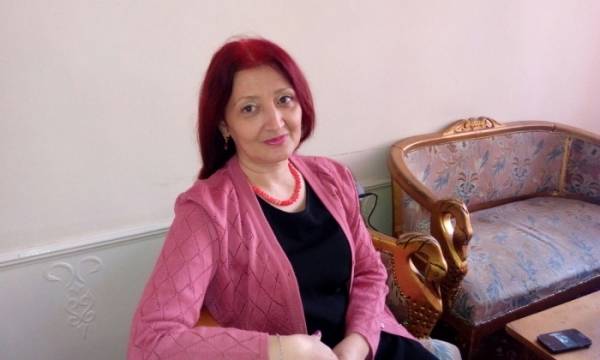Gulnara Inandzh
Director
International Online Information Analytic Center Ethnoglobus,
related info
https://www.turkishnews.com/ru/content/
The upcoming June 28th 2009 visit to Baku by Israeli President Shimon Peres, a visit arranged during the May 6th meeting in Prague between Azerbaijani President Ilham Aliyev and Israeli Foreign Minister Avigdor Lieberman, opens a new stage in Azerbaijani-Israeli relations and reflects among other things Jerusalem’s desire to strengthen relations with former Soviet republics in the aftermath of Israeli operations in Gaza.
In support of that effort, one marked out in the middle of 2008, the Israeli foreign ministry has established separate departments to deal with the European portion of the CIS, the South Caucasus and Central Asia, regions that had been the responsibility of the ministry’s broader Central European and Eurasian Department. The new units are provisionally called Eurasia I (dealing with the European portion of the CIS) and Eurasia II (dealing with the South Caucasus and Central Asia). The head of Eurasia II, which will also deal with Azerbaijan, is Shemi Tsur, the son of a Jewish returnee from the Iranian province of Eastern Azerbaijan (Falkov & Kogan 2009).
Apparently, Israeli political technologists have been working on the strengthening of official contacts with Azerbaijan intensively. Jewish groups in the West have been playing a major role in this and have conditioned their support for Azerbaijani interests on Baku’s opening of an embassy in Israel. As official representatives of the two countries have noted, despite the absence of an Azerbaijani embassy in Israel and of a general treaty between Azerbaijan and Israel, there exist various interagency accords which are working extremely well. As a result, Israel receives 30 percent of the oil it needs for internal use through the Baku-Tbilisi-Ceyhan pipeline, and bilateral trade is constantly expanding.
The absence of anti-Semitism in Azerbaijan, the good relations with Jews living in the country also help to fill the diplomatic vacuum. At the same time, the opening of an embassy of a Muslim-majority state in Israel and the visit of the Israeli president to a Muslim country are a moral support and example for Jews of the entire world and the Jewish state itself.
In this connection, it is worth noting that this is the second official visit of a senior Israeli official to Baku over the last decade. In 1998, Benjamin Netanyahu, then and now the prime minister of Israel, after completing a visit to China spent the night in Baku. After that time, no senior Israeli officials visited Azerbaijan for some years. But beginning in 2006, when Avigdor Lieberman, the chairman of the Our Home is Israel party became minister for strategic affairs, the number of visits increased. Lieberman himself visited Baku in the summer of 2007 just after Iranian President Mahmoud Ahmadinejad did.
These efforts by Israeli and Western companies and organizations in Azerbaijan have been viewed by Iranian ideologues as part of a network directed against Iran. One cannot deny that the overthrow of the current Tehran government or the forced change of its aggressive policy and the weakening of its position in the region are one of the key issues for Israel and the West and in particular the US. As a result, the concern of Iran on this score cannot be considered baseless paranoia.
On the other hand, with the assignment at the end of April 2009 of a new director of the Asian infrastructure of the Bureau for Ties with the Russian-language Jewish Diaspora Natif, Israel specified its policy concerning work with the diaspora in the CIS countries. In that, Azerbaijan is presented as a major focus of Natif’s activities (Izrus 2009). It could hardly be otherwise, given the Jewish communities of that country, as well as in Iran, Kazakhstan and Uzbekistan.
The Jewish lobby and Israel in recent years have attempted to establish contacts with their compatriots living in Iran. In the meantime, the Southern Azerbaijanis who live in Iran represent another issue for relations between Baku and Tehran. With the goal of removing the World Congress of Azerbaijanis out from under the influence of Iran, for example, a change in the leadership of the organization has occurred. The Committee for work with compatriots was reformed into a structure for work with the diaspora, which thus reduced its focus on compatriots in areas adjoining Azerbaijan where Azerbaijanis have lived from time immemorial on their historical lands.
As was already noted, if the visit of Shimon Peres to Baku bears a moral character for Jews, for Azerbaijan it is one additional opportunity to attract the attention of the world community and the entire Jewish world to Azerbaijan and to define new patterns of cooperation and the inclusion of Azerbaijan in new major trans-regional projects. But as one might expect, Iran’s reaction has been aggressive, including overt threats to Azerbaijan. Baku responded diplomatically but made it very clear that it did not intend to retreat from the meeting or from its expanding ties with the Jewish state.
In spite of its threatening language, it is completely clear that Iran will not violate the borders of Azerbaijan as it did earlier. And clearly, Azerbaijan was prepared for such an Iranian reaction, but in preparing for it, Baku recognized that neither the US nor Israel could advance an effective policy toward Iran without taking Azerbaijan into account. Indeed, now economically and politically strong, Azerbaijan is capable of engaging itself in pro-active regional politics, as opposed to a defensive one it had adhered to before.
References
Falkov, Mikhail & Kogan, Alexander (2009) “Izrail’ otdel’no vzyalsya za Kavkaz I Tsentral’nuyu Aziyu” [“Israel Moved to Separately Deal with the Caucasus and Central Asia”], Izrus, 19 January, available at http://izrus.co.il/dvuhstoronka/article/2009-01-19/3449.html, accessed 13 June 2009.
Izrus (2009) “’Nativ’ Izbral Kuratora po Tsentral’noy Azii I Kavkazu”, Izrus, 1 March, available at http://izrus.co.il/diasporaIL/article/2009-03-01/3883.html, accessed 14 June 2009.
source :


Leave a Reply